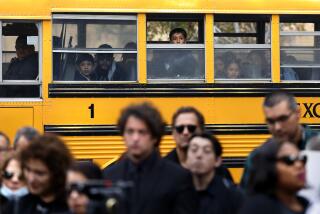An Incredible Self-Delusion
- Share via
American 15-year-olds may not know math but, by golly, they sure do feel good about the subject.
The latest international rankings show the same old results: This superpower’s children aren’t super at math. According to the Organization for Economic Cooperation and Development, which tested students in 40 countries, the U.S. ranked 28th -- tied with Latvia. Not only do the usual suspects -- Hong Kong, Japan, Finland -- do better, but so does South Korea, a much poorer nation that spends considerably less on education.
Enough disheartening news. Let’s get to where American teens excel. And that’s at thinking they’re doing fine. U.S. students were the most likely to report getting good grades in math (72%). Only a quarter of the Hong Kong students, No. 1 in the math rankings, pulled that off. Most American students also thought they were good at math, while more than half the Hong Kong students denigrated their own math abilities.
The U.S. curriculum in self-esteem seems to be a world beater. It even trumps reality. If only all that self-confidence led to college and good jobs. In the computer-animated hit movie “The Incredibles,” the eponymous superhero dad memorably fumes about schools: “They keep inventing new ways to celebrate mediocrity.” The celebration at hand is a fourth-grade graduation ceremony, and the line evoked a deep, if suppressed, chuckle from parents who had haplessly attended their children’s mortarboard-clad graduations from infant day care, preschool and kindergarten. No one is spared the bumper stickers proclaiming “My child is a super reader, a good citizen, a student of the month at Everybody-Gets-An-Honor Elementary School.” Once that would have been considered unseemly boasting; now it’s seen as building self-esteem.
A young child expresses frustration that her drawing of a face looks more like a house, and we rave about her talent rather than help her learn art skills. The bar mitzvah or bat mitzvah, a Jewish rite of passage for 13-year-olds that requires extensive study and reflection, has given popular birth to the secular “faux mitzvah,” a huge party bestowed for the feat of turning adolescent.
California’s self-esteem-on-campus movement was born in the late 1980s after a state task force likened it to a “vaccine” that would prevent academic failure and drug abuse. Thousands of studies since have found no proof of such a payoff.
Incredible to think that a thwarted character from an animated movie might have made one of the more profound observations in recent memory about the American education system.
More to Read
Sign up for Essential California
The most important California stories and recommendations in your inbox every morning.
You may occasionally receive promotional content from the Los Angeles Times.













